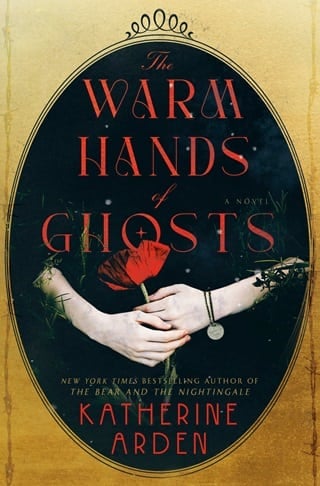Chapter 5: The Voice of the Seventh Angel
HALIFAX, NOVA SCOTIA, CANADIAN MARITIMES
January–February 1918
When Laura was small, her mother used to tell her stories of Armageddon. It was coming, she’d say. This year. Or next. She’d describe the pageantry of it: the Four Horsemen, the Beast from the Sea, the devil riven and falling. Fire from heaven, trumpets and thrones, the infallible judgment of God. Rewards for the good, and punishments for the wicked. Laura used to dream of it, as a child—terrible angels, a great dragon—and she always ate her peas and helped with the washing-up, so God would see her virtuous.
And you were right, Maman,Laura thought. It caught us up after all. War, plague, famine, death, the sky on fire, the sun black. Aren’t you glad you were right? You couldn’t change anything, you couldn’t stop anything. But at least you knew it was coming. The end of the world. Was that comforting, in the end?
Other times Laura would think, furiously, at her mother, Pageantry? Justice? What a joke. Armageddon was a fire in the harbor, a box delivered on a cold day. It wasn’t one great tragedy, but ten million tiny ones, and everyone faced theirs alone.
The day after Laura opened the box, she worked a fourteen-hour shift at the hospital, but even work was not enough to keep her from thinking.
“Iven?” said the doctor-in-charge once, but she shook her head, and got on with it.
That night, she wrote the Red Cross, and her brother’s CO, for news, sitting at her little writing desk, with a second glass of gin beside her. She didn’t need to think what to say in her letter. She’d read a hundred just like it: How did he die, where did he die? She sealed the flap, and finished her gin staring out the window.
The answer from the Red Cross was strange. Private Wilfred Iven is missing presumed killed following the taking of Passchendaele Ridge. Further information will be sent on.
Laura crumpled the letter in her hand. Then she smoothed it out, frowning. Missing could mean taken prisoner, but it usually meant blown to kingdom come. Her father, who’d been alongside the Mont Blanc when all that high explosive ignited, was missing. Jimmy Shaw, who’d disappeared on Passchendaele Ridge, was also, technically, missing.
But if Freddie was missing in the kingdom come sense—she couldn’t have his clothes, could she? Or his tags. His Bible. Unwillingly, she remembered the Parkeys’ séance. BUT HES ALIV…
The Parkeys were a delightful trio of swindlers.
Then another letter came, in reply to one of Laura’s. From the head sister of Laura’s old mobile ambulance. Kate White had been with Laura at Brandhoek, working while the gas alarm blared, keeping an ear out for incoming shells, trying to stop wounded boys from tearing their stitches when they crawled for cover under their cots.
Laura had to put Kate’s letter under every light she could muster in order to puzzle out the faint lines of pencil, daubed with mud and rain. The phrasing of the sentences was careful, and a little strange:
I am so glad you are alive, Laura. We feared the worst, when we heard the news from Halifax. I hope you will not give up hope. Why, a patient of mine said he saw his captain, beloved and dead three years, staring at him through a window. Anything, after all, is possible. Do not give up hope, my dear.
Laura read through this missive twice and then sat back. Nurses wrote kindly fictions to bereaved relatives all the time, but Kate wouldn’t do that to her. Of course, Kate’s letters had to pass under the eye of the military censor, so perhaps she was trying to convey something obliquely. But Laura couldn’t imagine what. Kate had nursed in South Africa years before war broke out in Europe; she was the least fanciful person Laura knew. Laura found herself thinking of the odd postcard, sewn so carefully into Freddie’s jacket. I will bring him back…
At that point, Laura wrote to everyone she knew, anywhere on the Front. Was he there? Did he die in this hospital? Or that one? Where? How? Do you know where he is buried?
She got replies, of course. Condolences, nonanswers. But she could get no reply that satisfied her.
· · ·Another week went by, and a note came from the beautiful woman from the séance: Mrs. Penelope Shaw. Mrs. Shaw was much more concise on paper than she was in person, her writing a flawless copperplate:
I am afraid of sounding heartless as well as frivolous, when you are in mourning, and as the Parkeys tell me, much engaged at the hospital. But if you have any inclination, would you like to have tea with me? I can promise sugar, I think, and oatcakes and sandwiches—plenty of both. And I have a chum staying with me whom I should like you to meet. We were girls together, and she has been overseas like you.
Laura hesitated. But anything, she thought, was better than what she was doing now, her days a blur of work, her evenings a blur of stealthy drinking. And Mrs. Shaw had been kind, the night Laura opened the box by the kitchen fire.
Laura went to the desk and dashed off a reply: Thank you, very happy to join etc.
 Fullepub
Fullepub 



